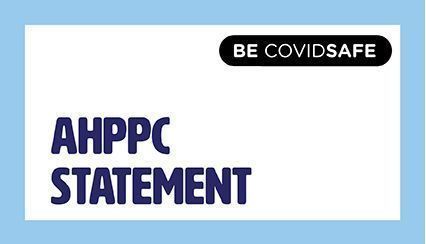
The Australian Health Protection Principal Committee (AHPPC) notes:
- the escalation of community transmission of the Omicron variant of COVID-19 as Australia continues to move through the National Plan to transition Australia's National COVID-19 Response (the National Plan).
- that current and expected future high caseloads necessitate a change in public health actions including policies and processes for test, trace, isolate and quarantine (TTIQ) to support public health sustainability, social cohesion and economic recovery.
- that as local epidemiology is rapidly becoming similar across jurisdictions, nationally consistent definitions and public health recommendations will assist clear communication and community adherence and lead to public confidence.
As case numbers in Australia increase, the effectiveness of TTIQ declines. The recommendations below take a pragmatic approach to TTIQ in a high case environment and the living with COVID policy approach. The AHPPC acknowledges that public health efforts may not identify considerable numbers of cases and may not manage a significant proportion of the transmission risk. Public health efforts will be required to focus on highest risk and rely on individuals and workplaces to manage their own risk. Consequently, the AHPPC stresses that the proposed changes will likely limit the ability of TTIQ to suppress transmission of COVID-19 at a population level but taking a focused outbreak approach can reduce the impact on the most vulnerable in our community. Other population level approaches including public health and social measures (PHSM) and ongoing vaccination, particularly achieving high booster coverage, are key to keeping cases within manageable levels and therefore preventing health system overwhelm. A shift to greater use of RAT tests by individuals, industry and the community over PCR tests will also be required. AHPPC will continue to monitor the outbreak situation, including epidemiology, booster effectiveness and treatments and review TTIQ measures as necessary.
Testing
The AHPPC notes current settings for testing are placing considerable pressure on available laboratory resources and recommends that PCR tests should only be used where they will change the public health or clinical management of an individual. Specifically, the AHPPC recommends that PCR testing should not be required for interstate domestic travel or surveillance testing.
The AHPPC recognises that whole genome sequencing (WGS) is no longer able to be performed on each positive case and needs to be directed to areas with the greatest utility for clinical decision-making, pandemic control and advancing knowledge of the Omicron variant. AHPPC recommends that all critical care COVID-19 cases and, where feasible, all cases admitted to hospital wards, have WGS performed and details of vaccination and clinical status collected for analysis and reporting. Additionally, at least one case in an outbreak in a Residential Aged Care Facility (RACF) should similarly have WGS performed to support review and analysis of characteristics of Omicron outbreaks in RACFs. Whole genome sequencing should also continue for overseas acquired cases to assist surveillance of the potential import of new variants.






